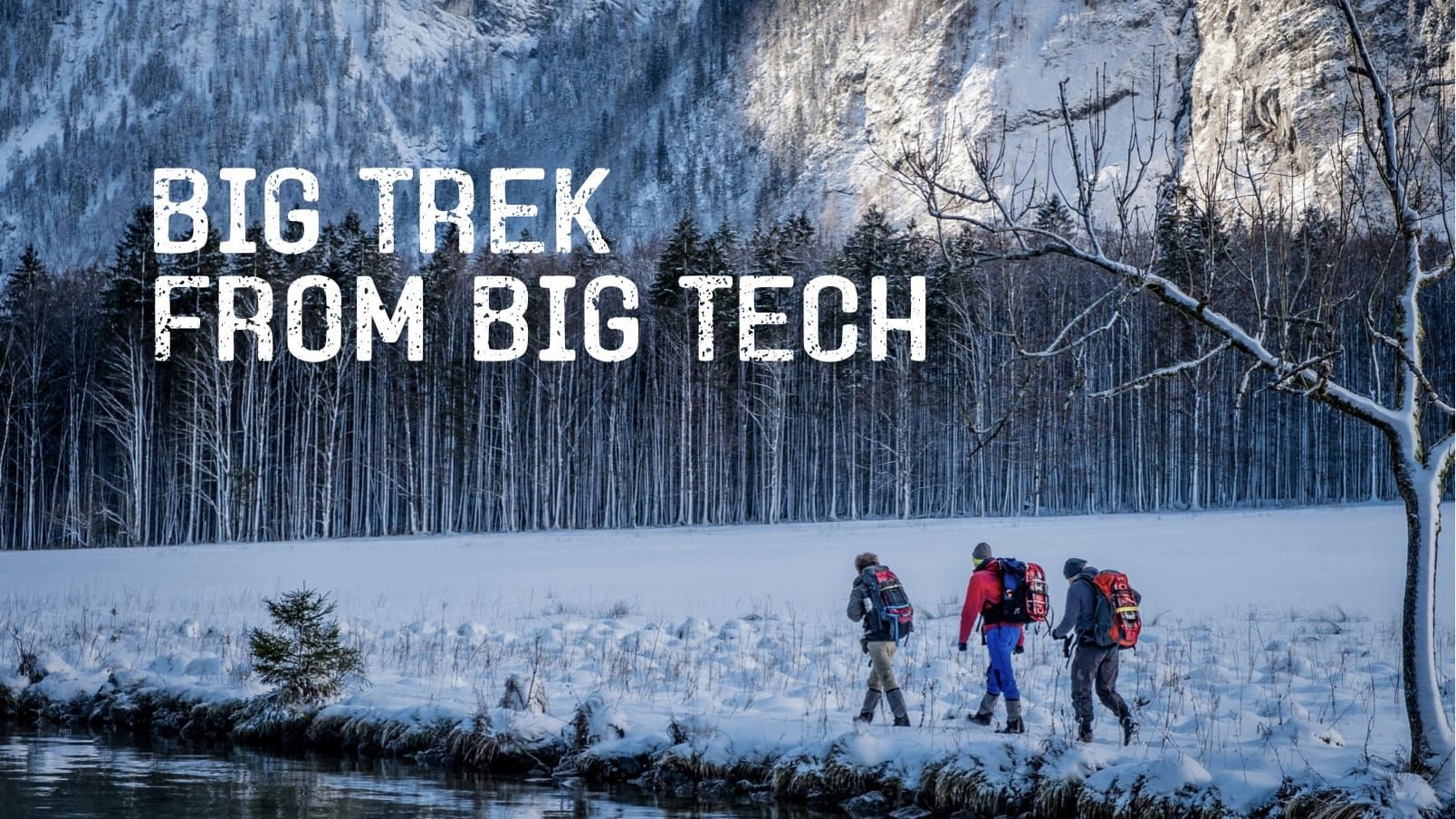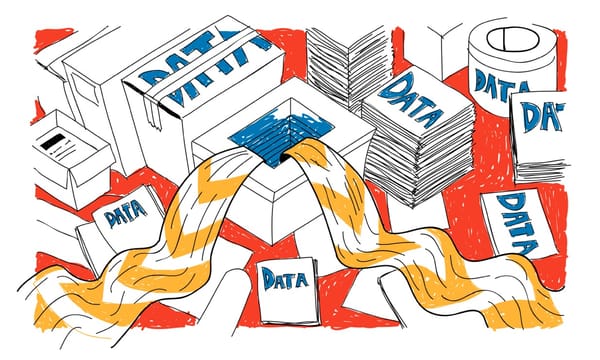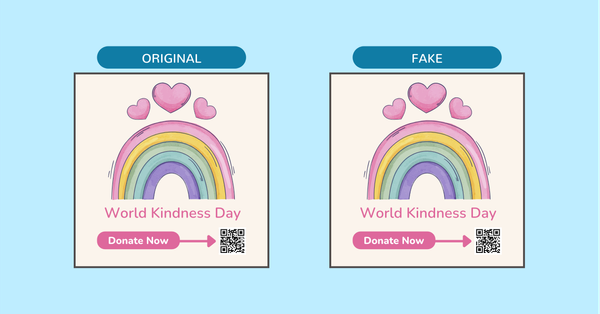We're in an era where using Big Tech products for managing our online presence, including our work and our relationships, feels inevitable. But it's really high time for taking steps towards protecting ourselves from data mining, surveillance, lock-in and human rights abuses. And we can certainly reduce our dependency on companies that are misaligned with our values, if not fully remove them. Sure, it requires effort and stamina, and yes, I'll even say it: it's a big trek from big tech. Sorry, not sorry. 😁
I get a great deal of questions about tools I use and/or recommend, and I finally compiled this list. My intent is to keep updating this list regularly, as my curiosity about new tools is ongoing, day-by-day. The internet can be pretty awesome when you leave the trodden path. Also, I've almost certainly missed mentioning a favourite.
Don't expect all services to be free, though! Actually paying for things that are valuable to you, made by other people, is a pretty reasonable deal. And some of these encourage funding in collaboration with friends.
Blog/newsletter 🧑💻
Having your own space to write can be empowering. Most of all, and especially if you own your own domain name, it is sustainable. People can always find you in the same place – at your domain. And if social networks die this is naturally where you let people know where to reach you. And if you don't feel like writing publicly, there is real value in just having a "business card page". Your singular address and start page.
- Ghost – open-source, you can self-host and monetize your writing (search for "Ghost CMS hosting providers" if you want to evaluate managed hosting) – working to integrate with ActivityPub.
- Write.as – a writing platform connected to the Fediverse, they have a free tier and if you are a paid subscriber and downgrade, your writing will still remain online
- WriteFreely – the open source tool powering Write.as, that you can install on your own server
- Posthaven – this old-school service has a goal of forever hosting, even after you stop paying – and note that 10 blogs (that readers can subscribe to) are included in the monthly fee
I don't generally recommend Wordpress anymore. Some years back it just became too bloated. And last year the Automattic CEO went rogue . I also avoid Substack, which has long had a recurring nazi problem. But I get that it's a tough choice for many.
For more info on owning your own space, see my 2022 newsletter on online resilience.
Bookmark manager 🔖
I used to be a fan of the social bookmarking site del.icio.us and Raindrop is a tool I use every day. I mention it here because it provides a ton of value for me in saving articles and PDFs I want to read later. It also makes it easy to share collections of links with others. A general principle is of course that I don’t use tools like this for bookmarking content that I wouldn’t want others to know I am reading. It’s developed and managed by Rustem Mussabekov, a Kazakhstan-based designer/developer, and uses AWS servers in Germany.
- Raindrop.io – all your categories can be given public RSS feeds,
As an example, check out my Digital Ethics collection.
Chat, including video 💬
I do like messaging apps that pride themselves on not knowing anything about you. I’d argue that Signal is an essential app today
- Signal – the app all privacy experts recommend
- Threema – Swiss alternative to Signal
- Delta Chat – decentralized, with multi-profile and multi-device support
- Element (Matrix) – open source and flexible hosting
- Rocket Chat – open source with a team collaboration focus
Cloud/photo storage 🗂️
It's still someone else's computer, but that can make some things easier for sharing. If there is content you really don't want to risk being seen by outsiders, the general advice is to not store it online.
- pcloud – Switzerland-based with a lifetime payment option available
- Jottacloud – servers in Norway powered by 100% renewable energy
- Exoscale – Switzerland-based S3 compatible object storage, meaning it can easily replace your Amazon (AWS) storage
- Hetzner – also S3-compatible with servers in Germany and Finland
- NextCloud – the content collaboration solution you can self-host, offering Files, Talk, Groupware, and Office
Email 📬
Probably one of your most vulnerable touchpoints, a dependable email platform is worth your investment. If you forget your password somewhere else you generally need your email to recover it. If someone with criminal intent gains access to your email you can be in for a world of trouble.
- Migadu – extremely price-worthy if you have many accounts and domains, Swiss company with servers in France – I love their Pro/Cons page with The Drawbacks.
- Proton – "Swiss privacy", with an Easy Switch app for migration
- Tuta – encrypts the entire mailbox, based in Germany
- Soverin – in the Netherlands, with servers across Europe
- Posteo – German-based, maximising sustainability and ethics, with autocrypt support, no own domains
I had Fastmail on the main list before but pulled it down here. It's Aussie-made and owned, but all servers are unfortunately in the US. This makes them a bit more vulnerable than the rest right now.
Email for temporary use 📮
Sometimes you want to sign up, or download, but avoid the potential spam and tracking. That's when burner e-mail comes in handy.
- SimpleLogin – set up email aliases using your own domain
- Maildrop – free, disposable email addresses for any use
- Burnermail – forwards to an account of your choice – generate new burners with a click
Forms/surveys 🧐
Forms are a powerful way of gathering feedback on anything, when you're not in the room. I depend on this for everything from contact forms to questionnaries, quizzes and sales.
- Tally.so – free, intuitive and self-funded form builder based in Belgium
- Formbricks – the open source form builder you can self-host
Forum 🗯️
Many people say they can't leave the groups and forums they love on Big Tech platforms. There were lots of online forums before Big Tech though. These are two pieces of software that come recommended.
- Discourse – self-host a group forum on any topic, comes with an app and email integration
- Mattermost – self-host a premium version of a platform akin to Slack
- Zulip – another open-source alternative to Slack, Teams and Discord
Notes 📝
- Notesnook – your notes are stored encryped even on your device
- Outline – note-taking software I use to write, collaborate and share texts with others
- Tiddlywiki – a note-taking single-file wiki that has been going strong for 20+ years! My colleague and friend James has been a long-time user
Office alternative 💼
- Cryptpad – end-to-end encrypted and open-source collaboration suite
- LibreOffice – compatible with Microsoft Office/365 files (.doc, .docx, .xls, .xlsx, .ppt, .pptx) and backed by a non-profit
Password manager 🕵️♀️
There are many password managers and the choice isn't always straightforward. Some of them let you share a family account, which can be a good thing. I added Bitwarden here because it may help you finally get started using one, if you don't already. Just gonna leave this here: Never have the same password to more than one service.
- Bitwarden – open source, safe and secure management of logins
Personally I have no passwords I can remember, for any service except my password manager.
Podcast players (podcatchers) 🎧
I have produced and listened to podcasts for almost two decades now. I've tried many apps over the years. You may be happy with what you have, or perhaps you want to try something new.
- Pocket Casts – Powerful player available for most platforms, free and open source, made in Australia
RSS readers 📰
The greatest, and most terribly disregarded, document structure in the history of the internet. In short: it allows us to read content from many places in one place. Imperative to podcasting, for example. Many of us swore by it in our use of Google Reader in the years 2005-2013.
- Feedbin – very flexible RSS reader that also gives you a unique, privacy-friendly e-mail address for email subscriptions
- Lire (for Mac/iOS) – pretty good at fetching full articles even when the RSS feed contains only a part of it
Bonus tip: You can convert newsletters to Atom feeds (which your reader will also read) with Kill the Newsletter.
Common Craft made a classic explainer video on RSS in 2007 (on YouTube).
Search engine 🔎
- DuckDuckGo – more powerful than most people realise, bangs are cool and mean you don't need to feel locked into only one search engine
- Qwant – French search engine, hosted in Europe
Self-hosting (VPS) 🔌
Yes, I am relatively technical but my coding and server management skills are mediocre at best. Running my own server seemed daunting and unreachable, until I came across Cloudron. Now, self-hosting my own apps on my own server (including several Ghost sites, document management, wikis, url shortener, social media, chat and more) is truly liberating. You'll need some skills to set everything up, but then it really runs very smoothly on its own, and certainly puts self-hosting within reach for many more people.
- Cloudron – ensures you get the latest releases within days and security fixes within 24 hours for apps and the server
- Yunohost – also has 1-click installation of apps but requires more maintenance from you
I wrote more about Indieweb and self-hosting my own space in 2022.
Social networks 📜
When it comes to the Fediverse there is really an endless number of different flavors of software you may want to try out. Mastodon and Pixelfed are the two most people are likely to start with.
- Mastodon – often referred to as a Twitter alternative, and you can of course join any instance that matches your values
- Pixelfed – there has been lots of development recently on this photo and video sharing platform
- Bluesky – I add this here with a warning: it’s looking good right now but their reliance on financial backers with a background in crypto has me wary; I have written more about how to ensure your resilience on Bluesky
- micro.blog – is a social media platform in itself but also happens to be where I back up most of my posts from other services
For newcomers to the Fediverse I recommend starting with an app that makes the experience a bit smoother, Mona for iOS/Mac or Tusky for Android. And in case you're curious, I actually don't use Mastodon myself, but software called Akkoma.
When I first started out, I wrote several guides for Mastodon. You’ll find me as @axbom@axbom.me on Fediverse/Mastodon, and @axbom.com on Bluesky.
Streaming 🎬
I talk a lot about the environmental costs of "AI" but streaming is likely just as big of a culprit. Alternative streaming platforms can be rewarding to try out, but also consider the benefits of renting at your library. 😊
- The Criterion Channel - Monthly curated collection of classic and contemporary films
- Mubi – a British global streaming platform with films by emerging and established filmmakers
- Invidious – an alternative front-end to YouTube, without all the tracking
Video meeting 🎥
- Jitsi – name your meeting room, click and meet, almost like a burner phone for online meetings
- Whereby – the small Norwegian platform I've used for a decade
VPN 🥷
- Mullvad – The Sweden-based and internationally acclaimed service that offers full anonymity – it's actually the only Virtual Private Network (VPN) I feel comfortable recommending
Web browser 🛜
It's not a bad idea to have a separate browser for all your logged in sessions, on Big Tech and otherwise (including video calls and streaming), and then use another primary browser for everyday surfing. That way it's harder for those logged-in sessions to track your movements on the web using embeds and tracking pixels.
- DuckDuckGo – yes, they have a browser, for Mac, Windows, iOS and Android
- Mullvad – yes, they also have browser, for Mac, Windows and Linux
- Firefox Focus – this is for mobile: both iOS and Android
- Librewolf – a custom version of Firefox focused on privacy, security and user freedom
A great complementary utility when you use multiple browsers is an app like Bumpr (Mac only), that allows you to choose which browser to open links in. A similar app for Windows is BrowserSelector.
Web analytics 📈
- Plausible – intuitive, lightweight and open source analytics, made and hosted in the EU
- Matomo – a comprehensive open source platform for web analytics with a ton of features
Web design
- Penpot – a web-based open-source design tool that can easily replace Figma, and do not miss all the tutorials by the brilliant and accessibility-minded Laura Kalbag
A word of advice for EU residents. Most experts agree the EU-US Data Privacy Framework is now null and void. When using US-based services, expect that your information can be read by US government actors. In which case, the less information a service collects about you, the better. The right to privacy is a human right.
Let me know if this post was useful to you, and if there are other nuggets out there you may want to share with me. This is a journey of exploration we can go on together.
Offline resilience
Something I do want to add, in light of the crumbling of democracy we are seeing across the world in 2025, is that it's important to mind your own wellbeing. And take small steps to ensure you have capacity left to check in with yourself and others. There is great power in more often choosing offline variants of dialogue and engagement. One path is to start attending local cultural events and more often visiting your library. Or getting to know a neighbour. These are the types of actions that fortify civil society.
Take care.









Member discussion